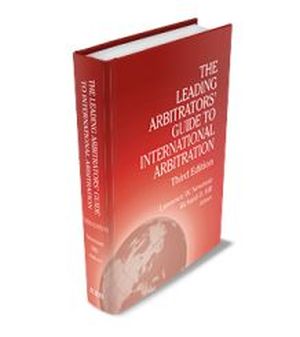
The Leading Arbitrators' Guide to International Arbitration - Fourth Edition continues to offer thoughtful advice and insights into the world of international arbitration from some of the most prominent and experienced international arbitrators in the world. The contributors are arbitrators from Australia, Belgium, Canada, Chile, Denmark, England, France, Germany, Italy, The Netherlands, Italy, Spain, Sweden, Switzerland and the USA.
Contributors offer insights and advice on the way in which international arbitrations are carried out from the point of view of arbitrators reading pleadings and memorials and listening to witnesses and hearing arguments. The authors' discussions are intended to be thoughtful, insightful and useful - and perhaps, occasionally, iconoclastic. As a result, there may be instances in which the authors disagree with one another on certain points. This is to be expected for there are often many routes that can be taken to achieve a result.
For this Fourth Edition, several additional arbitrators have brought fresh perspectives to topics covered by former authors: Patricia Peterson has joined Robert Davidson to discuss “Settlement Facilitation and the Use of ADR in International Arbitration” (Chapter 2), James Carter has addressed “The Role of the Chairman” (Chapter 7), Lawrence Schaner has written on “The Tribunal’s Appointment” (Chapter 10), John Beechey and Niccolo Landi have considered “The Party-appointed Arbitrator” (Chapter 15), and Rocio Digon and Anna Yamaoka-Enkerlin have drafted the chapter on “Witness Statements: Use and Abuse” (Chapter 26).
As international arbitration adapts to new challenges, also included are new chapters on topics of current interest, including Chiann Bao’s chapter on “Technology and Arbitration” (Chapter 9), John Townsend’s on “Expedited Arbitration” (Chapter 12), Stephanie Cohen’s on “Non-participating Parties” (Chapter 16) and Laurent Levy’s on “Artificial Intelligence and Arbitration” (Chapter 35). All other chapters have been updated by their original authors.
The book will be useful not only to persons who may serve as arbitrators in international arbitral proceedings but also to those who may, in their position as advocates, wish to persuade persons -- including, perhaps, the authors.